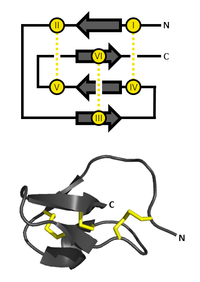
Photo from wikipedia
Significance The Wnt pathway is critical for regeneration of tissues such as lung, skin, and intestine. Using a cystine-knot peptide (CKP) drug-discovery platform, we identified a class of peptide agonists… Click to show full abstract
Significance The Wnt pathway is critical for regeneration of tissues such as lung, skin, and intestine. Using a cystine-knot peptide (CKP) drug-discovery platform, we identified a class of peptide agonists that bind to the Wnt receptor LRP6 and stimulate growth of stem cell–derived lung and human intestinal organoids. CKP agonists exhibit a unique mechanism of action because they enhance signaling only in the presence of a specific subset of Wnt proteins. As such, CKPs are differentiated from previously described antibody-based synthetic Wnt agonists and could provide a path for activating tissue-specific Wnt ligands, informing future therapeutic strategies, and possibly improving safety profiles in disease. Our findings advance the important frontier for designing next-generation agonists to modulate cellular signaling pathways.
Journal Title: Proceedings of the National Academy of Sciences of the United States of America
Year Published: 2022
Link to full text (if available)
Share on Social Media: Sign Up to like & get
recommendations!